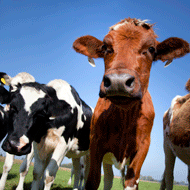Scotland and NI achieve lowest risk level for BSE

The new risk status was described as a ‘significant achievement’ for both countries.
Scotland and Northern Ireland have achieved ‘negligible risk’ status for bovine spongiform encephalitis (BSE).
The World Organisation for Animal Health (OIE) has recognised that the official BSE risk status for both countries is at the safest level, a decision that will help to open access to new markets for exports.
There have been no BSE cases in Scotland since 2009, and no cases in Northern Ireland since 2012. England and Wales continue to be recognised as having ‘controlled risk’ status for BSE.
The new risk status was described as a ‘significant achievement’ for both countries, and the result of tireless efforts by all those involved.
Frank Clark, president of the Scottish Association of Meat Wholesalers, said: “Scotland has lived with BSE since 1986 and the farming and meat industries have made massive efforts to manage and eradicate the disease.
“Today’s decision frees our industry to make full commercial use of Scotland’s high health status on behalf of producers, processors and wholesalers, opening the door to fresh marketing opportunities around the world.”
Responding to the news, BVA president Gudrun Ravetz said it is a testament to the years of hard work and collaboration between the respective governments, farmers, industry and vets, who are pivotal to the success of any disease control programme.
“We must of course continue to work together keep up high standards of biosecurity and surveillance in order to safeguard animal health, which is vital to both countries’ economies,” she added.
“This is excellent news for Scotland and Northern Ireland’s agri-food industry, especially as we look ahead at the trade deals which will need to be forged in the coming year or two, further demonstrating that our beef is produced to a high quality and standard of animal health for consumers in the UK and across the world.”



 The BSAVA has opened submissions for the BSAVA Clinical Research Abstracts 2026.
The BSAVA has opened submissions for the BSAVA Clinical Research Abstracts 2026.